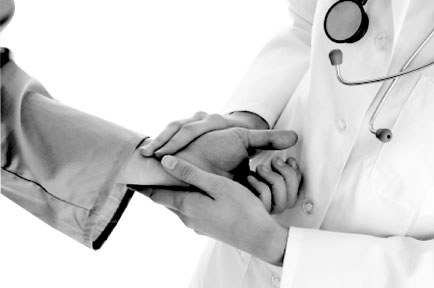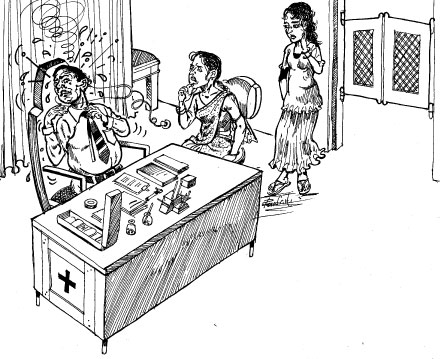|

Be Patient with your doctor
by Nilma DOLE
Do you know if your doctor is knowledgeable in giving you sound
advice? Are you really getting the service you deserve or aren't you
happy with what your doctor tells you?
Dr. Eugene Corea, the vice president of the College of General
Practioners, said that, a survey carried out more than a decade ago had
indicated that nearly 40,000 deaths occurred annually in the USA as a
result of medical errors. Conscious of the harm that errors in the
medical system could cause, the College had set up a Committee on
Patient Safety to work with patients and society in an effort to enhance
patient safety.
|
Four bio-ethical
principles
The four bio-ethical
principles have been described as:
* Autonomy - respect for the
individual and their ability to make decisions with regard
to their own health and future. Actions that enhance
autonomy are thought of as desirable and actions that
'dwarf' an individual and their autonomy are undesirable.
* Beneficence - actions
intended to benefit the patient or others
* Non-maleficence - actions
intended not to harm or bring harm to the patient and others
* Justice being fair or just
to the wider community in terms of the consequences of an
action
Summary Points
Four bio-ethical principles
that are often used in medical ethics analyses are autonomy,
beneficence, non-maleficence and justice.
* Where these principles are
invoked they must be correctly used and defined.
* Other methods of analysis
can produce a more holistic and three-dimensional approach
to problems
Confidentiality
Confidentiality is not a
single ethical principle in itself, rather it is linked in
to several bio-ethical principles.
Confidentiality shows a
respect for an individual's autonomy and their right to
control the information relating to their own health. In
keeping information about the patient secret the doctor is
acting beneficently. Disclosing information without the
patient's consent can damage the patient. For instance if a
doctor were to reveal privileged information about a
celebrity patient to the newspapers then this would be the
very reverse of beneficent i.e. maleficent Maintaining
confidentiality can therefore also be seen as
non-maleficent. |
 A few steps in understanding your doctor will make you knowledgeable
and help save your life and restore your health. "We made a few
recommendations about which characteristics are good. Family doctors
should have posters showing how qualified they actually are and signs at
a general practitioner's clinic should be for the benefit of patients,"
said Dr.Corea. A few steps in understanding your doctor will make you knowledgeable
and help save your life and restore your health. "We made a few
recommendations about which characteristics are good. Family doctors
should have posters showing how qualified they actually are and signs at
a general practitioner's clinic should be for the benefit of patients,"
said Dr.Corea.
"The first thing that you should know is whether your doctor is
registered with the Sri Lanka Medical Council and is qualified to
practise his profession", said the doctor. The next thing is to ensure
that the doctor has a good attitude when it comes to the appointment.
"When a doctor is angry or rude, patients tolerate him without being
aware of the harm the poor communications could cause to patients and
even to doctors, themselves" said Dr.Corea. He said, "Always talk to
doctors, see if they are not stressed or fussed because they should at
least be worth your money and effort." Your doctor should listen to you
attentively and have a positive attitude when talking. "If they are
overworked or temperamental, it may be safer to consult another doctor
or go to the same doctor later," he said.
Your doctor should clear your doubts and answer your questions
properly to the best of his knowledge. "Take all your records to your
doctor to make him aware of your background history and help him
diagnose your disease" said the doctor. Women should tell their doctor
if they are lactating or pregnant and they can even consult a lady
doctor if they prefer to discuss their problem with her.
"Your doctor should explain the steps of management and the follow-up
action needed for your health together with the possible consequences."
"When taking medicine, it is helpful for patients to be aware of what
has been good and bad for them in the past," said Dr. Corea.
 Side-effects and reactions to certain medicines vary from person to
person so that it is important to be mindful. Your doctor should clearly
explain the effects and side effects of the drugs prescribed and write
the relevant instructions legibly. "Sometimes, patients call upon the
pharmacists to issue them medicines without doctor's prescription or on
old prescriptions or even someone else's prescription! This isn't
advisable since the consequences could be disastrous," said Dr. Corea. Side-effects and reactions to certain medicines vary from person to
person so that it is important to be mindful. Your doctor should clearly
explain the effects and side effects of the drugs prescribed and write
the relevant instructions legibly. "Sometimes, patients call upon the
pharmacists to issue them medicines without doctor's prescription or on
old prescriptions or even someone else's prescription! This isn't
advisable since the consequences could be disastrous," said Dr. Corea.
If you have developed side effects for certain medicines prescribed
by the doctor, stop the medicine and consult your doctor again. "Doctors
should provide a good service at an affordable cost," he said. When a
doctor is unable to diagnose a patient's problem, he/she should refer
the patient to another doctor, medical institution or hospital.
"The doctor should tell the patient immediately if and when an error
occurred during treatment because it is the patient's right to know"
said Dr.Corea. He observed that the Patients' Safety Committee
recommendations had even queried, "Is your doctor accessible to you in
an emergency and are there any arrangements to contact him/her if he/she
isn't on call?" There should be arrangements in place for dealing with
such situations.
Dr. Corea said that doctors are only human and drew attention to the
somewhat mischievous quote attributed to the famous French philosopher
Voltaire, "Doctors are men who prescribe medicines of which they know
little, to cure diseases of which they know less, in human beings of
whom they know nothing." Should we not take Voltaire a bit more
seriously with only a pinch of salt? Dr. Corea asked.
Good health and diet
Dr. Shikha Sharma
What do you think good health means? Some people think it means not
being ill. Some think it means looking healthy, even if their blood
pressure is high. Others imagine that if they're fit, they're fine -
even if they suffer from some psychological disorder, such as addiction.
And for many of us in India, the word 'healthy' refers to an overweight
person!
So what is good health? Simply, it is achieved by a sincere intention
to be healthy. A series of flirtations will not produce long lasting
results. If you're committed to it, there are five basic principles to
mind.
1. Be consistent: If you aren't, even the best-designed package of
diet and exercise will not have an effect on your system. Most of us
tend to switch diet and exercise plans out of boredom. But there's a
reason why people in the glamour world look the way they do. They stick
to their programmes with dedication.
For instance, weight loss is a big issue with many people. Yet, they
want to shed weight fast - which is unhealthy. Slow and steady is the
best way. A target of a kilo a month means 12 kilos off in a year. To
change your body, you need about 12-18 months - and that has to be
followed by a schedule of healthy eating and exercise for the rest of
your life.
So keep in mind that consistency should constitute 80 per cent of
your programme.
2. Keep moving: Whether you jog, swim, dance, gym or play a sport,
the important thing is to keep your muscles active. Otherwise, they will
deteriorate, which means greater strain on the skeletal system. Your
exercise plan should include routines for flexibility, strengthening of
spine and muscles, and cardiovascular and lungs training. Exercise helps
you lose weight, is relaxing, and if you do it outdoors, gives you a
healthy dose of Vitamin D. Plus, it helps you sweat and that's great for
removing toxins.
3. Find a balance: None of us is a machine. So it's natural that
every now and then, we let go of our health plan, whether voluntarily or
involuntarily. But binge eating or drinking, extreme diets and punishing
exercise schedules are all signs of an internal imbalance.
Balance is about accepting both good days and bad, and continuing
with the effort regardless. Many of us give up too soon. We have
unhealthy habits and practices that can't be wished away overnight.
Remember that it takes years to replace bad habits.
4. Sleep well: If you sleep badly, your mind and your body suffer.
Lack of sleep makes you vulnerable to stress and when you are
stressed, the internal environment of the body becomes acidic, which
makes your system hyper reactive. So, aim for mental relaxation via
music, chanting, meditation and pranayam. If you're mentally relaxed,
you will find physical relaxation easier. Plus, you will be able to stay
focused on your diet and exercise plans.
5. Eat according to your body type: If you manage to pull this off
even 30 per cent of the time, it will go a long way to keeping you fit.
First, make sure you drink enough water. The balance of the body's
acid base is maintained by drinking enough water to allow toxins to be
cleansed via sweat, breath and urination. Water needs vary according to
weather and body type, so it could range from eight glasses a day to
three litres a day. The best way to check your natural need for water is
to avoid tea, coffee and cold drinks for a day and see how many times
you want a beverage. That's how many times you actually want water.
Next, make sure there's enough fibre in your diet - and that it comes
from natural sources such as unpolished rice, broken wheat or dalia,
dals with chhilka, fruits and vegetables. Lack of fibre causes diseases
like obesity, diabetes and high cholesterol. Fibre is naturally present
in plant foods, but we remove it by processing. By switching to whole
grains, we increase the amount of fibre in our diets, and eat less
calorie dense foods.
Make sure you get healthy oils in your diet by eating nuts and oil
seeds. Finally, include super foods like aloe vera, wheat grass juice,
barley grass juice, spirulina proteins and tulsi in your routine.
- Hindustan Times
Do not over-indulge!
Veenu Singh
Remember how often you've been told that an excess of anything is bad
for you? It's true. It's not just excesses of bad things like fast
foods, sugar or oily foods that fall in this category. Even foods or
habits that are generally considered healthy can make you ill if you
over-indulge. Here's how.
 Juice diets a juice diet is said to be a good way to detoxify your
body. "But extend it for longer than a day or two and it can lead to
fainting, dizziness, low blood pressure, vomiting, diarrhoea and kidney
problems besides constant headaches, fatigue and hypoglycaemia," says
Brunch columnist Dr. Shikha Sharma. Juice diets a juice diet is said to be a good way to detoxify your
body. "But extend it for longer than a day or two and it can lead to
fainting, dizziness, low blood pressure, vomiting, diarrhoea and kidney
problems besides constant headaches, fatigue and hypoglycaemia," says
Brunch columnist Dr. Shikha Sharma.
Pregnant or nursing women, children, people with diabetes, low blood
sugar, eating disorders, kidney disease, anaemia and low blood pressure,
and people who are underweight should avoid the juice diet.Moreover,
fruit juices can lead to acidity. Instead, try vegetable juices and
coconut water.
One-food diets many fad diets advocate eating only one type of food.
This can be harmful. Says Preeti Vijay, head of department, dietetics,
Max Healthcare, "Even if you lose weight on a no-carb diet, the no-carb
rule will lead to low blood pressure and low calcium and sodium levels.
Similarly, a high protein diet can increase your level of saturated
fats, leading to high cholesterol. And though fibre is excellent, too
much can lead to bloating and acidity." Vijay recommends not more than
20 gms of fibre a day. For protein, have one gm per kilo of your body
weight. Interestingly, even though papaya is considered healthy, too
much of it can lead to diarrhoea and acidity.
And cutting down an essential like sugar can lead to a low level of
glycogen in the body.
Vitamins and supplements a healthy adult eating a balanced diet
doesn't need extra vitamins, provided there are no extra physiological
demands on the body.
- Hindustan Times
Loneliness is harmful for health
People who have friends but don't really bond with them or are in
relationships without any emotional connect can end up feeling really
lonely. And this loneliness can lead to poor health, according to new
research. The two newly published University of Arizona studies say
superficial relationships give birth to feelings of detachment.
"There is an association between social networks and health but the
precise mechanism is not understood," said Stacey Passalacqua, who
recently earned her UA doctorate in interpersonal and health
communication with a minor in psychology.
Passalacqua and Chris Segrin, the UA communication department head
and lead author on the papers, decided to study individual perceptions
of stress and social support to understand ways loneliness may be linked
to health.
In their study of 265 adults ages 19 to 85, Segrin and Passalacqua
found that stress serves a crucial function for those who reported being
lonely.
They found that lonely people were prone to have fewer close
connections, were less apt to manage daily stressors well and tended not
to keep up on their health. Also, lonely people did not get adequate
sleep.
Segrin noted that age did not predict whether a person would be
lonely and living away from close friends and family did not have a
negative effect.
Also, having relationships mediated by digital modes is not
necessarily problematic, though relationships well-established prior to
the distance were likely the strongest.
Being partnered did not shield a person from feelings of loneliness,
Segrin added. Instead, having close friends and family members appeared
to be more important.
Segrin said: "The mere presence of a relationship is not always
something that is going to lead to you feeling satisfied and supported."
Another curious conclusion: The team found that, above all, loneliness
is a matter of perception.
Segrin said: "Loneliness is the discrepancy between your achieved and
desired level of social contact, and that has important implications.
The portrait of a lonely person is very difficult to paint because
what is really important is what is in your head." So people can
experience the same stressors - maybe the car breaks down, or a checking
account overdraws, or maybe a relationship is not going well and someone
just needs to vent - and have entirely different responses.It is no
wonder, then, that certain people with large social networks also
express feelings of loneliness. When it comes to relationships, quality,
not quantity, is the decisive factor, Passalacqua said. She explained:
"There are so many people we have in our day-to-day interactions. But
the absence of close family members and close friends is something that
should be taken seriously. Sometimes we don't realize how important
these close relationships are to our health." The findings were
published in a co-authored article, "Functions of Loneliness, Social
Support, Health Behaviours, and Stress in Association With Poor Health,"
in a June issue of Health Communication.
-ANI
|

